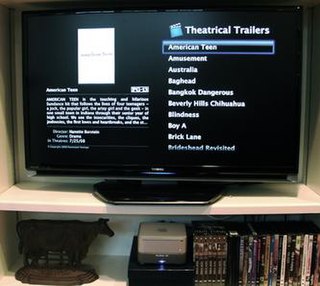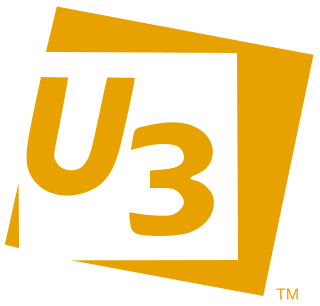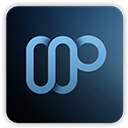
Knoppix, stylized KNOPPIX, is an operating system based on Debian designed to be run directly from a CD / DVD or a USB flash drive. It was first released in 2000 by German Linux consultant Klaus Knopper, and was one of the first popular live distributions. Knoppix is loaded from the removable medium and decompressed into a RAM drive. The decompression is transparent and on-the-fly.

Mac OS 9 is the ninth and final major release of Apple's classic Mac OS operating system, which was succeeded by Mac OS X 10.0 in 2001, starting the Mac OS X family of operating systems. Introduced on October 23, 1999, it was promoted by Apple as "The Best Internet Operating System Ever", highlighting Sherlock 2’s Internet search capabilities, integration with Apple's free online services known as iTools and improved Open Transport networking. While Mac OS 9 lacks protected memory and full pre-emptive multitasking, lasting improvements include the introduction of an automated Software Update engine and support for multiple users.

A flash drive is a data storage device that includes flash memory with an integrated USB interface. A typical USB drive is removable, rewritable, and smaller than an optical disc, and usually weighs less than 30 g (1 oz). Since first offered for sale in late 2000, the storage capacities of USB drives range from 8 to 256 gigabytes (GB), 512 GB and 1 terabyte (TB). As of 2023, 2 TB flash drives were the largest currently in production. Some allow up to 100,000 write/erase cycles, depending on the exact type of memory chip used, and are thought to physically last between 10 and 100 years under normal circumstances.

A home theater PC (HTPC) or media center computer is a convergent device that combines some or all the capabilities of a personal computer with a software application that focuses on video, photo, audio playback, and sometimes video recording functionality. Since the mid-2000s, other types of consumer electronics, including game consoles and dedicated media devices, have crossed over to manage video and music content. The term "media center" also refers to specialized application software designed to run on standard personal computers.
Norton AntiVirus is an anti-virus or anti-malware software product founded by Peter Norton, developed and distributed by Symantec since 1990 as part of its Norton family of computer security products. It uses signatures and heuristics to identify viruses. Other features included in it are e-mail spam filtering and phishing protection.

U3 was a joint venture between SanDisk and M-Systems, producing a proprietary method of launching Windows software from special USB flash drives. Flash drives adhering to the U3 specification are termed "U3 smart drives". U3 smart drives come preinstalled with the U3 Launchpad. Applications that comply with U3 specifications are allowed to write files or registry information to the host computer, but they must remove this information when the flash drive is ejected. Customizations and settings are instead stored with the application on the flash drive.

MediaPortal is an open-source media player and digital video recorder software project, often considered an alternative to Windows Media Center. It provides a 10-foot user interface for performing typical PVR/TiVo functionality, including playing, pausing, and recording live TV; playing DVDs, videos, and music; viewing pictures; and other functions. Plugins allow it to perform additional tasks, such as watching online video, listening to music from online services such as Last.fm, and launching other applications such as games. It interfaces with the hardware commonly found in HTPCs, such as TV tuners, infrared receivers, and LCD displays.

Windows Genuine Advantage (WGA) was an anti-infringement system created by Microsoft used to validate the licences of several Microsoft Windows operating systems upon accessing services such as Windows Update and Microsoft Download Center.
Cactus Data Shield (CDS) is a form of CD/DVD copy protection for audio compact discs developed by Israeli company Midbar Technologies. It has been used extensively by EMI, BMG and their subsidiaries. CDS relies on two components: Erroneous Disc Navigation and Data Corruption.

The terms Recovery disc, Rescue Disk/Disc and Emergency Disk all refer to a capability to boot from an external device, possibly a thumb drive, that includes a self-running operating system: the ability to be a boot disk/Disc that runs independent of an internal hard drive that may be failing, or for some other reason is not the operating system to be run.

Windows Live Mesh is a discontinued free-to-use Internet-based file synchronization application by Microsoft designed to allow files and folders between two or more computers to be in sync with each other on Windows and Mac OS X computers or the Web via SkyDrive. Windows Live Mesh also enabled remote desktop access via the Internet.

BackupHDDVD is a small computer software utility program available in command line and GUI versions which aids in the decryption of commercial HD DVD discs protected by the Advanced Access Content System. It is used to back up discs, often to enable playback on hardware configurations without full support for HDCP. The program's source code was posted online, but no licence information was given.

Oracle VM VirtualBox is a hosted hypervisor for x86 virtualization developed by Oracle Corporation. VirtualBox was originally created by InnoTek Systemberatung GmbH, which was acquired by Sun Microsystems in 2008, which was in turn acquired by Oracle in 2010.

The security of Advanced Access Content System (AACS) has been a subject of discussion amongst security researchers, high definition video enthusiasts, and consumers at large since its inception. A successor to Content Scramble System (CSS), the digital rights management mechanism used by commercial DVDs, AACS was intended to improve upon the design of CSS by addressing flaws which had led to the total circumvention of CSS in 1999. The AACS system relies on a subset difference tree combined with a certificate revocation mechanism to ensure the security of high definition video content in the event of a compromise.
The PlayStation Portable system software is the official firmware for the PlayStation Portable (PSP). It uses the XrossMediaBar (XMB) as its user interface, similar to the PlayStation 3 console.

gOS or "good OS" was an Ubuntu-based Linux distribution created by Good OS LLC, a Los Angeles-based corporation. Its CIO David Liu described that after meeting Enlightenment and open source people, he realized that his dream to bring Web 2.0 applications into mainstream use could be achieved by creating a Linux distribution that made it easy for users to access Google and Web 2.0 applications. David Liu went on to create the Chinese Twitter clone called Wozai (我在), leaving gOS officially defunct.

Amiga Forever is an Amiga preservation, emulation and support package published by Cloanto, allowing Amiga software to run on non-Amiga hardware legally without complex configuration.
Carbonite, Inc. is an American company that offers an online backup service, available to Windows and macOS users. In 2019 it was acquired by Canadian software company OpenText. It backs up documents, e-mails, music, photos, and settings. It is named after carbonite, the fictional substance used to freeze Han Solo in Star Wars: The Empire Strikes Back. Carbonite was the first such service to offer unlimited backup space for a fixed price. Previously, all online backup services were priced by the gigabyte; many other vendors have since changed to an unlimited model.

μTorrent, or uTorrent, is a proprietary adware BitTorrent client owned and developed by Rainberry, Inc. The "μ" in its name comes from the SI prefix "micro-", referring to the program's small memory footprint: the program was designed to use minimal computer resources while offering functionality comparable to larger BitTorrent clients such as Vuze or BitComet. μTorrent became controversial in 2015 when many users unknowingly accepted a default option during installation which also installed a cryptocurrency miner.














